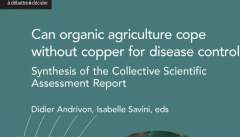
Copper Interaction with Xylella fastidiosa
The Xylella Files seminar series' next speaker is Qing Ge from Auburn University, who will present research on the role of copper in X. fastidiosa biology
Dear Xylellaphiles,
Every week you will receive a message including a new Zoom link for the seminar (seminars are Tuesday 9am, Berkeley time). On Tuesdays we will have a waiting room and probably allow people in a few minutes before the hour (9am California time). Before the talk starts we will mute you, introduce the speaker (briefly), and not have interruptions during the talk (chat is ok). Talks will run for 30-40 minutes, after which we will have a Q&A session. Please use the chat or the 'raise hand' function in Zoom to ask questions, we will be moderating the Q&A. IMPORTANT - We will be using Zoom as a platform, emails will be sent out weekly with a link and password. Please have a Zoom account to log in, otherwise our Berkeley account may not allow you to join us. Talks will not be recorded. We kindly ask attending scholars to please follow a No Publication/Photography Policy according to the guidelines of the Gordon Research Conferences (https://www.grc.org/about/grc-policies-and-legal-disclaimers/). The latter is particularly important as we hope the series will promote the work of young scientists and increase synergies. You are welcome to directly contact speakers or others about data, slides, etc. Finally, we ask that attendees respect each other and our mutual work as part of the shared community of researchers studying X. fastidiosa.
Sincerely,
The Xylella Files Organizing Committee
Rodrigo Almeida, Andreina Castillo Siri, Alexandra Kahn, Dylan Beal, Monica Donegan and Isabel Bojanini
Qing Ge
Applied and Basic Aspects of Copper Interaction with Xylella fastidiosa
Xylella fastidiosa, a gram-negative, plant pathogenic bacterium that causes severe diseases and asymptomatic colonization in more than 600 different plants worldwide. Copper (Cu) as a widely used antimicrobial agent is hardly used to control X. fastidiosa in the field, but is often applied to its hosts for other pathogens’ management. High Cu accumulations in field soils were found in X. fastidiosa living environment and threatened its survival. In our research, we attempted to understand the interactions between Cu and X. fastidiosa, especially in aspects of X. fastidiosa virulence, molecular basis of Cu resistance /homeostasis, and further features that may influence Cu resistance ability in X. fastidiosa. First, We conducted in planta experiments to determine the influence of Cu in X. fastidiosa infection using tobacco as a model. Uptake of Cu was noticed in plants treated with CuSO4-amended water. However, this did not help to control disease symptoms development, nor the growth of X. fastidiosa in planta. Then, molecular basis of Cu resistance/homeostasis was studied in relation to virulence. Mutants of Cu-related genes copA and copB were more sensitive to Cu than the wild-type (WT) strain. All the mutants increased disease severity under Cu-amended conditions, and the increments were higher than WT. Last, our analysis showed that no clear correlation was found between Cu resistance/homeostasis ability and X. fastidiosa phylogeny, host and/or location of isolation. We found that Cu content in planta could influence virulence of X. fastidiosa. Cu resistance/homeostasis in X. fastidiosa is important for its in planta colonization and disease symptoms development, which is associated with copA and copB genes that function differently to fulfill Cu resistance/homeostasis. Meanwhile, Cu resistance/homeostasis in X. fastidiosa is not simply decided by host and/or location of isolation. My research helped to unveil the mechanisms of Cu resistance/homeostasis in X. fastidiosa, and highlight the important role that Cu plays in X. fastidiosa full virulence as well as its interaction with host plants.
Join Zoom Meeting https://berkeley.zoom.us/j/98148348838?pwd=QTJQS3dxZjQ3OFk1WVI4MnpsSkJ2UT09 Meeting ID: 981 4834 8838 Passcode: 979683
Note: Xylella file series are that. Contact Prof. Rodrigo Almeida to register.
Date Speaker Title
January 26 Steven White Modelling the spread of Xylella fastidiosa
February 2 Sabina Avosani Philaenus spumarius: from behaviours to vibrational manipulation
February 9 Biagio DiSalvo Interactions between X. fastidiosa and grapevine endophytic bacteria
February 16 Christian Colella Global Pathogens, Local Pathologies: Social Movements and Scientific Knowledge in the Case of Xylella fastidiosa in Italy
February 23 Qing Ge Relationship between Cu homeostasis and virulence of X. fastidiosa
March 2 Daniel White Fluid dynamics simulations suggest novel targets for fighting plant diseases caused by Xylella fastidiosa
March 9 Mario Pagano Someone to blame: the Italian Xylella case before the European Court of Justice
March 16 Ofir Bahar Xylella fastidiosa outbreak in Israel
March 23 Marina Monte Host plant selection by Philaenus spumarius nymphs: using the ground cover as a population control strategy
March 30 Michael O'Leary Restriction-modification systems and nanopore-derived methylation patterns in Xylella fastidiosa
April 6 Vinton Thompson The biology of spittlebugs in relation to Xylella – some consequences of xylem feeding as a lifestyle
April 13 Gianni Gilioli A spatial epidemiological model describing the local disease dynamics of Xylella fastidiosa
April 20 Kasia Rybak How the Arabidopsis immune system responds to Xylella fastidiosa
April 27 Miguel Román Écija Phenotypic and genomic traits potentially associated with plant colonization and pathogenicity of two Spanish strains of Xylella fastidiosa subsp. multiplex ST6
 |
| I've invited you to fill out a form: | |
| Xylella Files Seminar Sign up | |
|
|

